A Study of Aristotelian Ethics: Virtue, Business and Moral Character
VerifiedAdded on 2022/07/28
|7
|1531
|26
Essay
AI Summary
This essay delves into Aristotelian virtue ethics, highlighting Aristotle's concept of the soul and his division of virtues into intellectual and moral categories. It discusses the significance of virtues like justice, temperance, and friendliness in business and professional contexts, drawing connections between Aristotelian and Confucian ethics. The analysis includes a review of literature that emphasizes the importance of moral character, practical wisdom (phronesis), and the cultivation of virtues in shaping ethical professionals. The essay also addresses concerns about the erosion of ethical values in contemporary society, particularly within business schools, and concludes by reaffirming the enduring relevance of virtue ethics in fostering moral behavior and achieving happiness. Additionally, an annotated bibliography is included, summarizing key research articles related to virtue ethics in finance, professional practice, and leadership.
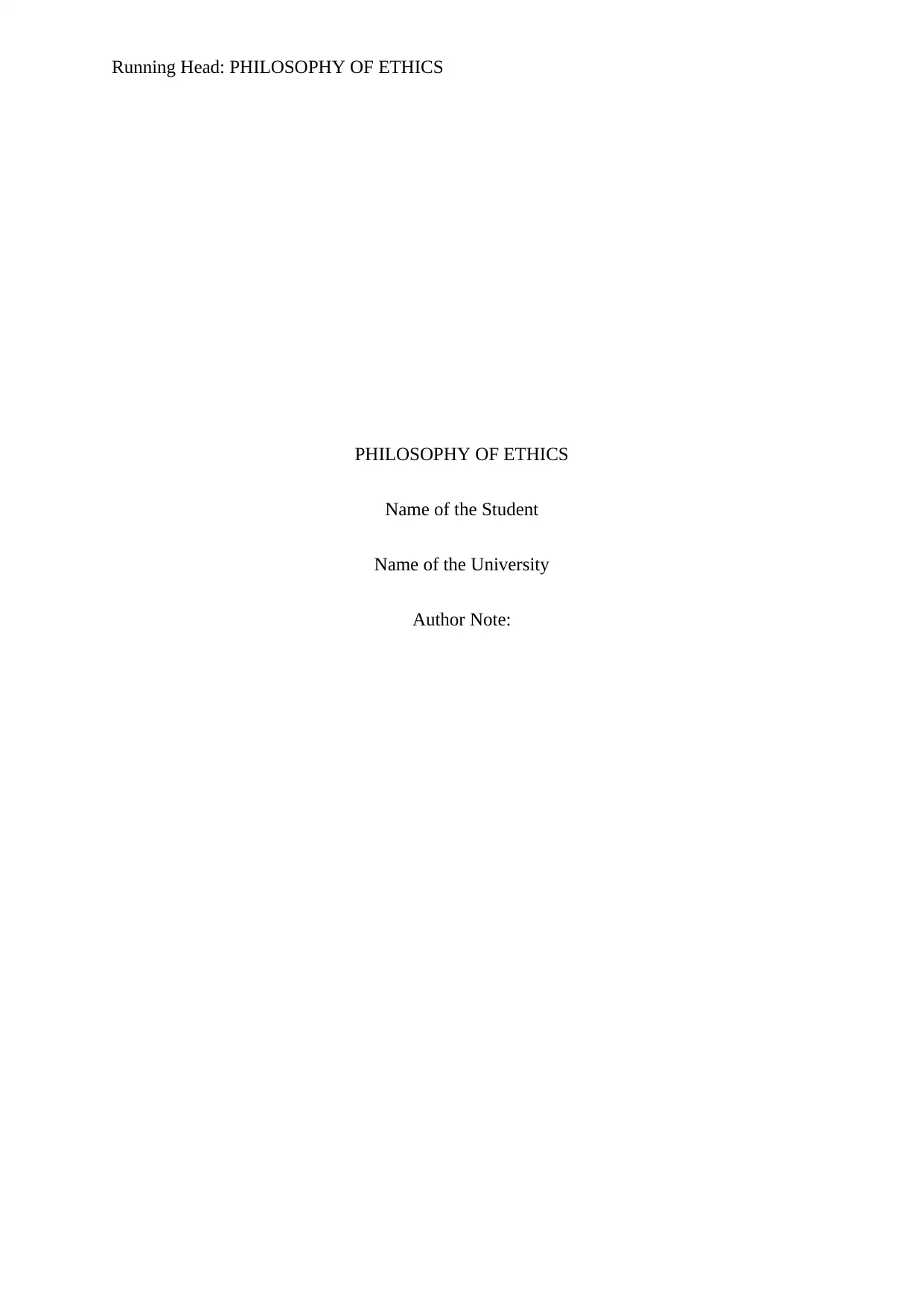
Running Head: PHILOSOPHY OF ETHICS
PHILOSOPHY OF ETHICS
Name of the Student
Name of the University
Author Note:
PHILOSOPHY OF ETHICS
Name of the Student
Name of the University
Author Note:
Paraphrase This Document
Need a fresh take? Get an instant paraphrase of this document with our AI Paraphraser
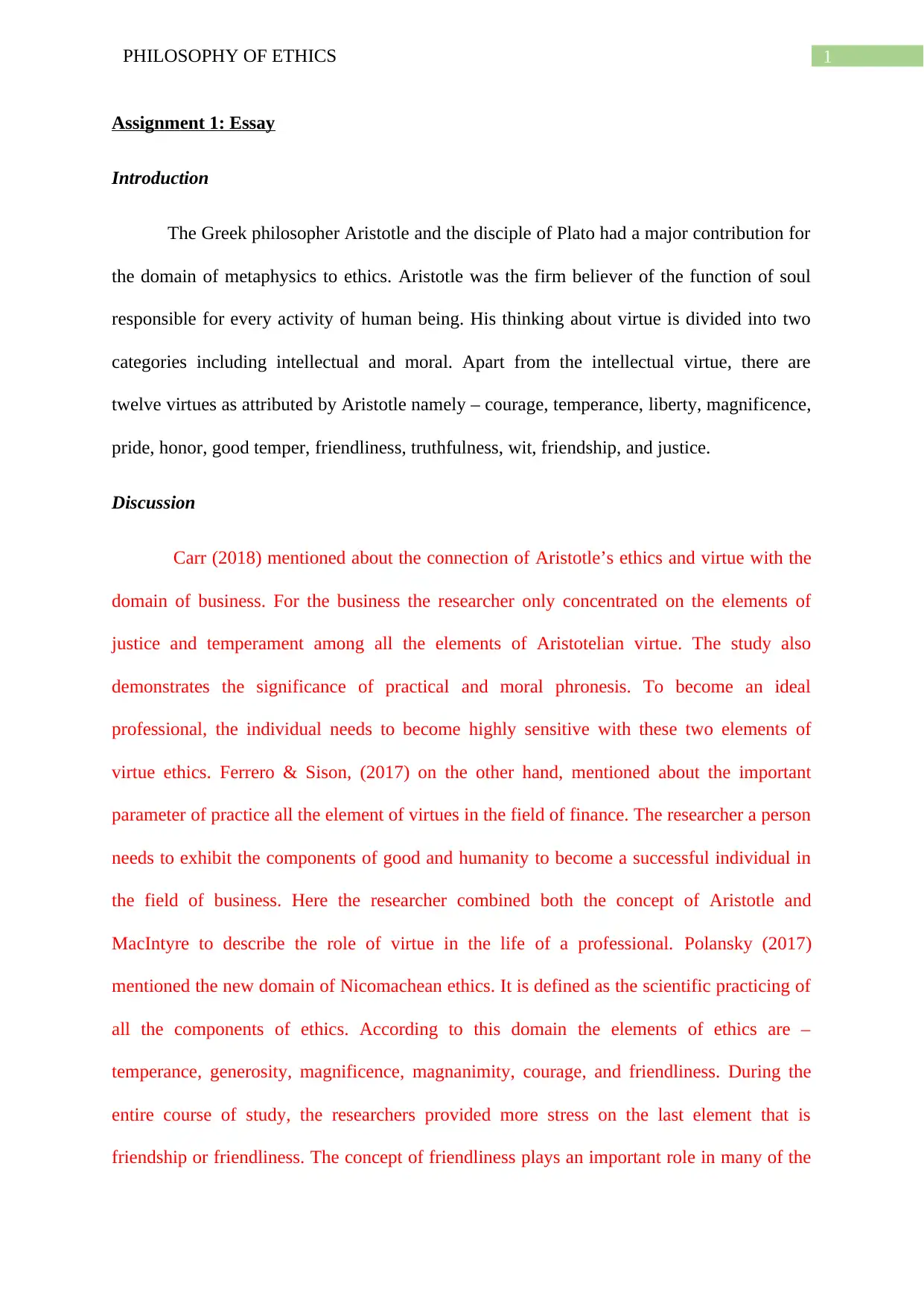
1PHILOSOPHY OF ETHICS
Assignment 1: Essay
Introduction
The Greek philosopher Aristotle and the disciple of Plato had a major contribution for
the domain of metaphysics to ethics. Aristotle was the firm believer of the function of soul
responsible for every activity of human being. His thinking about virtue is divided into two
categories including intellectual and moral. Apart from the intellectual virtue, there are
twelve virtues as attributed by Aristotle namely – courage, temperance, liberty, magnificence,
pride, honor, good temper, friendliness, truthfulness, wit, friendship, and justice.
Discussion
Carr (2018) mentioned about the connection of Aristotle’s ethics and virtue with the
domain of business. For the business the researcher only concentrated on the elements of
justice and temperament among all the elements of Aristotelian virtue. The study also
demonstrates the significance of practical and moral phronesis. To become an ideal
professional, the individual needs to become highly sensitive with these two elements of
virtue ethics. Ferrero & Sison, (2017) on the other hand, mentioned about the important
parameter of practice all the element of virtues in the field of finance. The researcher a person
needs to exhibit the components of good and humanity to become a successful individual in
the field of business. Here the researcher combined both the concept of Aristotle and
MacIntyre to describe the role of virtue in the life of a professional. Polansky (2017)
mentioned the new domain of Nicomachean ethics. It is defined as the scientific practicing of
all the components of ethics. According to this domain the elements of ethics are –
temperance, generosity, magnificence, magnanimity, courage, and friendliness. During the
entire course of study, the researchers provided more stress on the last element that is
friendship or friendliness. The concept of friendliness plays an important role in many of the
Assignment 1: Essay
Introduction
The Greek philosopher Aristotle and the disciple of Plato had a major contribution for
the domain of metaphysics to ethics. Aristotle was the firm believer of the function of soul
responsible for every activity of human being. His thinking about virtue is divided into two
categories including intellectual and moral. Apart from the intellectual virtue, there are
twelve virtues as attributed by Aristotle namely – courage, temperance, liberty, magnificence,
pride, honor, good temper, friendliness, truthfulness, wit, friendship, and justice.
Discussion
Carr (2018) mentioned about the connection of Aristotle’s ethics and virtue with the
domain of business. For the business the researcher only concentrated on the elements of
justice and temperament among all the elements of Aristotelian virtue. The study also
demonstrates the significance of practical and moral phronesis. To become an ideal
professional, the individual needs to become highly sensitive with these two elements of
virtue ethics. Ferrero & Sison, (2017) on the other hand, mentioned about the important
parameter of practice all the element of virtues in the field of finance. The researcher a person
needs to exhibit the components of good and humanity to become a successful individual in
the field of business. Here the researcher combined both the concept of Aristotle and
MacIntyre to describe the role of virtue in the life of a professional. Polansky (2017)
mentioned the new domain of Nicomachean ethics. It is defined as the scientific practicing of
all the components of ethics. According to this domain the elements of ethics are –
temperance, generosity, magnificence, magnanimity, courage, and friendliness. During the
entire course of study, the researchers provided more stress on the last element that is
friendship or friendliness. The concept of friendliness plays an important role in many of the
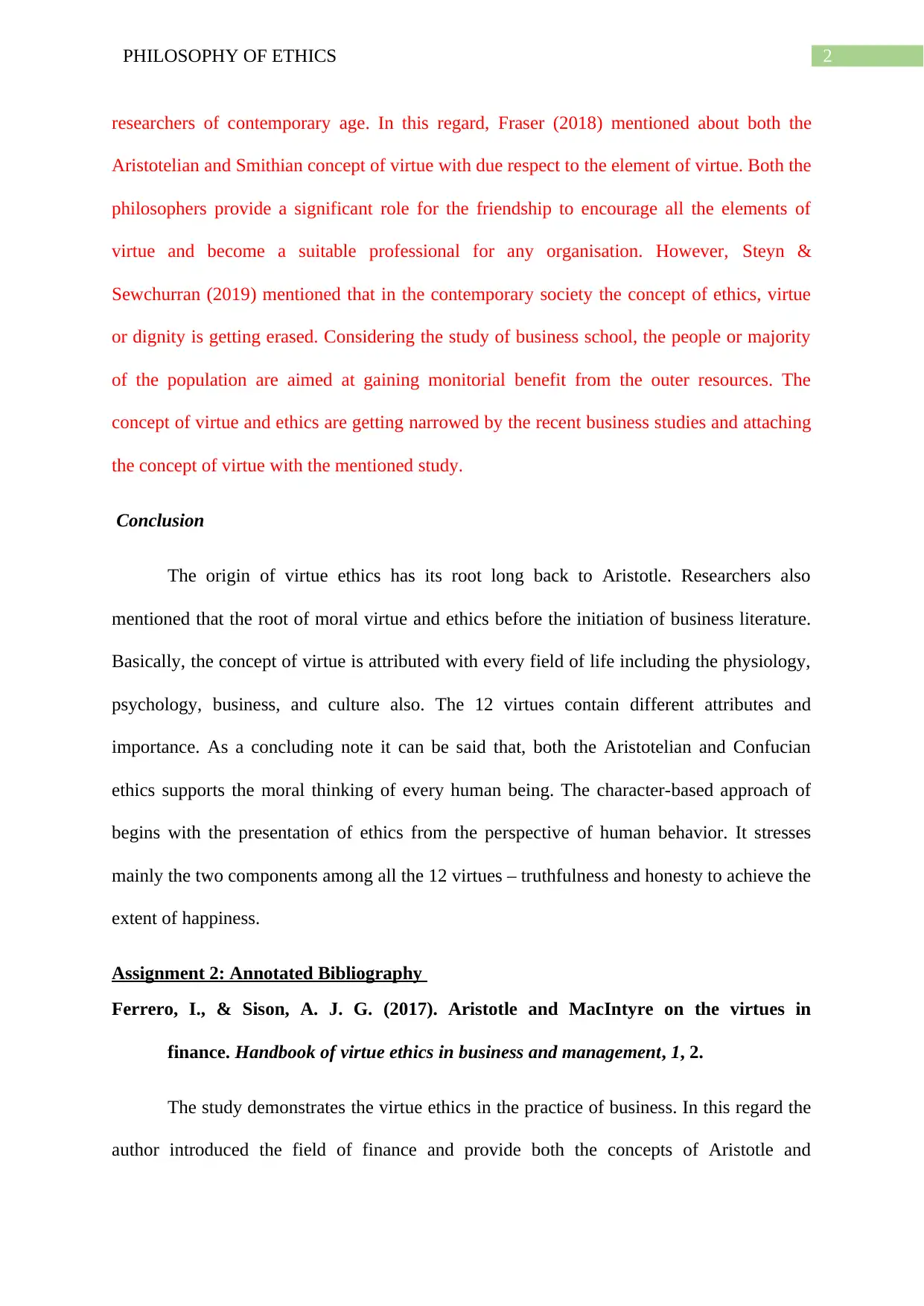
2PHILOSOPHY OF ETHICS
researchers of contemporary age. In this regard, Fraser (2018) mentioned about both the
Aristotelian and Smithian concept of virtue with due respect to the element of virtue. Both the
philosophers provide a significant role for the friendship to encourage all the elements of
virtue and become a suitable professional for any organisation. However, Steyn &
Sewchurran (2019) mentioned that in the contemporary society the concept of ethics, virtue
or dignity is getting erased. Considering the study of business school, the people or majority
of the population are aimed at gaining monitorial benefit from the outer resources. The
concept of virtue and ethics are getting narrowed by the recent business studies and attaching
the concept of virtue with the mentioned study.
Conclusion
The origin of virtue ethics has its root long back to Aristotle. Researchers also
mentioned that the root of moral virtue and ethics before the initiation of business literature.
Basically, the concept of virtue is attributed with every field of life including the physiology,
psychology, business, and culture also. The 12 virtues contain different attributes and
importance. As a concluding note it can be said that, both the Aristotelian and Confucian
ethics supports the moral thinking of every human being. The character-based approach of
begins with the presentation of ethics from the perspective of human behavior. It stresses
mainly the two components among all the 12 virtues – truthfulness and honesty to achieve the
extent of happiness.
Assignment 2: Annotated Bibliography
Ferrero, I., & Sison, A. J. G. (2017). Aristotle and MacIntyre on the virtues in
finance. Handbook of virtue ethics in business and management, 1, 2.
The study demonstrates the virtue ethics in the practice of business. In this regard the
author introduced the field of finance and provide both the concepts of Aristotle and
researchers of contemporary age. In this regard, Fraser (2018) mentioned about both the
Aristotelian and Smithian concept of virtue with due respect to the element of virtue. Both the
philosophers provide a significant role for the friendship to encourage all the elements of
virtue and become a suitable professional for any organisation. However, Steyn &
Sewchurran (2019) mentioned that in the contemporary society the concept of ethics, virtue
or dignity is getting erased. Considering the study of business school, the people or majority
of the population are aimed at gaining monitorial benefit from the outer resources. The
concept of virtue and ethics are getting narrowed by the recent business studies and attaching
the concept of virtue with the mentioned study.
Conclusion
The origin of virtue ethics has its root long back to Aristotle. Researchers also
mentioned that the root of moral virtue and ethics before the initiation of business literature.
Basically, the concept of virtue is attributed with every field of life including the physiology,
psychology, business, and culture also. The 12 virtues contain different attributes and
importance. As a concluding note it can be said that, both the Aristotelian and Confucian
ethics supports the moral thinking of every human being. The character-based approach of
begins with the presentation of ethics from the perspective of human behavior. It stresses
mainly the two components among all the 12 virtues – truthfulness and honesty to achieve the
extent of happiness.
Assignment 2: Annotated Bibliography
Ferrero, I., & Sison, A. J. G. (2017). Aristotle and MacIntyre on the virtues in
finance. Handbook of virtue ethics in business and management, 1, 2.
The study demonstrates the virtue ethics in the practice of business. In this regard the
author introduced the field of finance and provide both the concepts of Aristotle and
⊘ This is a preview!⊘
Do you want full access?
Subscribe today to unlock all pages.

Trusted by 1+ million students worldwide
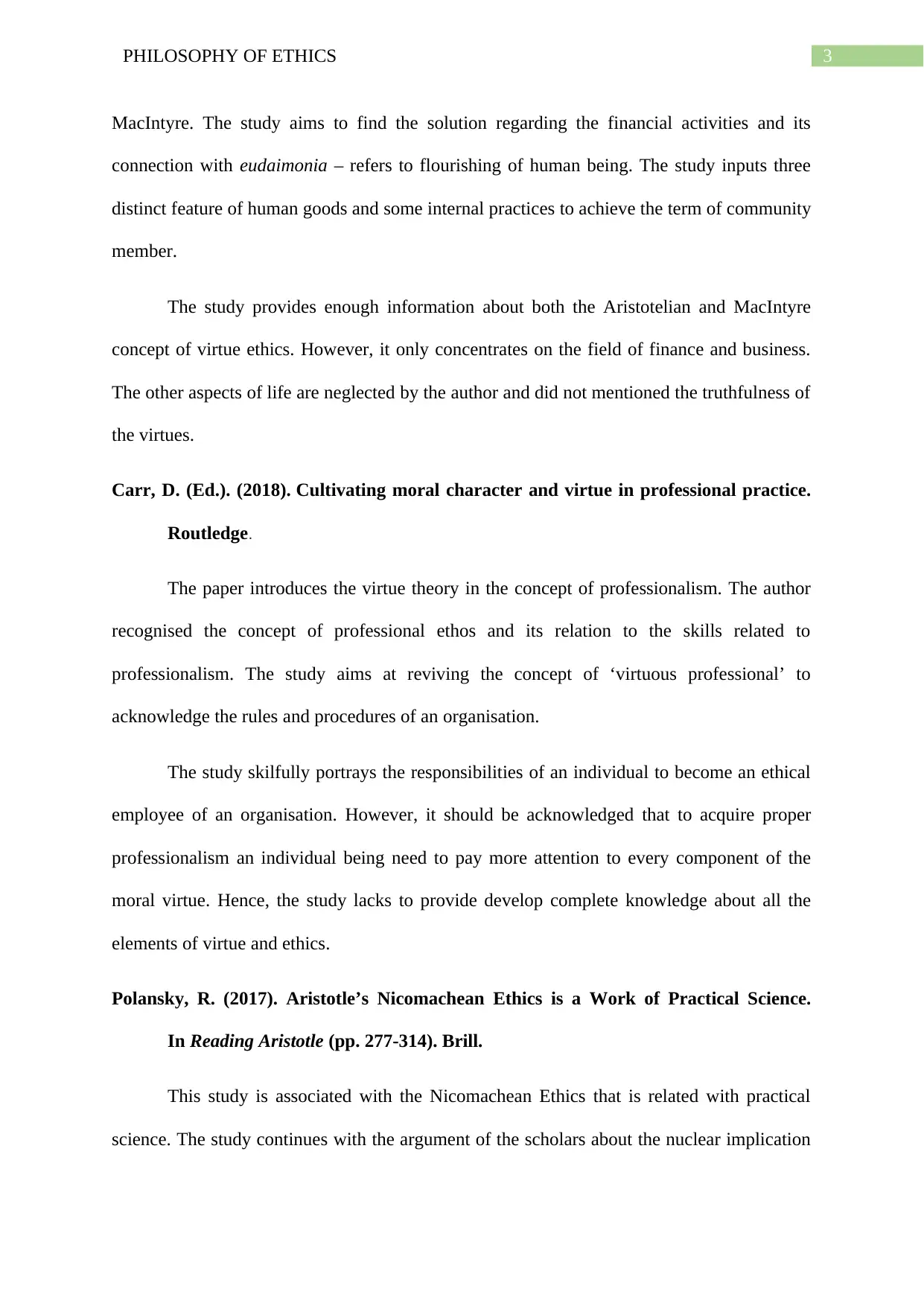
3PHILOSOPHY OF ETHICS
MacIntyre. The study aims to find the solution regarding the financial activities and its
connection with eudaimonia – refers to flourishing of human being. The study inputs three
distinct feature of human goods and some internal practices to achieve the term of community
member.
The study provides enough information about both the Aristotelian and MacIntyre
concept of virtue ethics. However, it only concentrates on the field of finance and business.
The other aspects of life are neglected by the author and did not mentioned the truthfulness of
the virtues.
Carr, D. (Ed.). (2018). Cultivating moral character and virtue in professional practice.
Routledge.
The paper introduces the virtue theory in the concept of professionalism. The author
recognised the concept of professional ethos and its relation to the skills related to
professionalism. The study aims at reviving the concept of ‘virtuous professional’ to
acknowledge the rules and procedures of an organisation.
The study skilfully portrays the responsibilities of an individual to become an ethical
employee of an organisation. However, it should be acknowledged that to acquire proper
professionalism an individual being need to pay more attention to every component of the
moral virtue. Hence, the study lacks to provide develop complete knowledge about all the
elements of virtue and ethics.
Polansky, R. (2017). Aristotle’s Nicomachean Ethics is a Work of Practical Science.
In Reading Aristotle (pp. 277-314). Brill.
This study is associated with the Nicomachean Ethics that is related with practical
science. The study continues with the argument of the scholars about the nuclear implication
MacIntyre. The study aims to find the solution regarding the financial activities and its
connection with eudaimonia – refers to flourishing of human being. The study inputs three
distinct feature of human goods and some internal practices to achieve the term of community
member.
The study provides enough information about both the Aristotelian and MacIntyre
concept of virtue ethics. However, it only concentrates on the field of finance and business.
The other aspects of life are neglected by the author and did not mentioned the truthfulness of
the virtues.
Carr, D. (Ed.). (2018). Cultivating moral character and virtue in professional practice.
Routledge.
The paper introduces the virtue theory in the concept of professionalism. The author
recognised the concept of professional ethos and its relation to the skills related to
professionalism. The study aims at reviving the concept of ‘virtuous professional’ to
acknowledge the rules and procedures of an organisation.
The study skilfully portrays the responsibilities of an individual to become an ethical
employee of an organisation. However, it should be acknowledged that to acquire proper
professionalism an individual being need to pay more attention to every component of the
moral virtue. Hence, the study lacks to provide develop complete knowledge about all the
elements of virtue and ethics.
Polansky, R. (2017). Aristotle’s Nicomachean Ethics is a Work of Practical Science.
In Reading Aristotle (pp. 277-314). Brill.
This study is associated with the Nicomachean Ethics that is related with practical
science. The study continues with the argument of the scholars about the nuclear implication
Paraphrase This Document
Need a fresh take? Get an instant paraphrase of this document with our AI Paraphraser
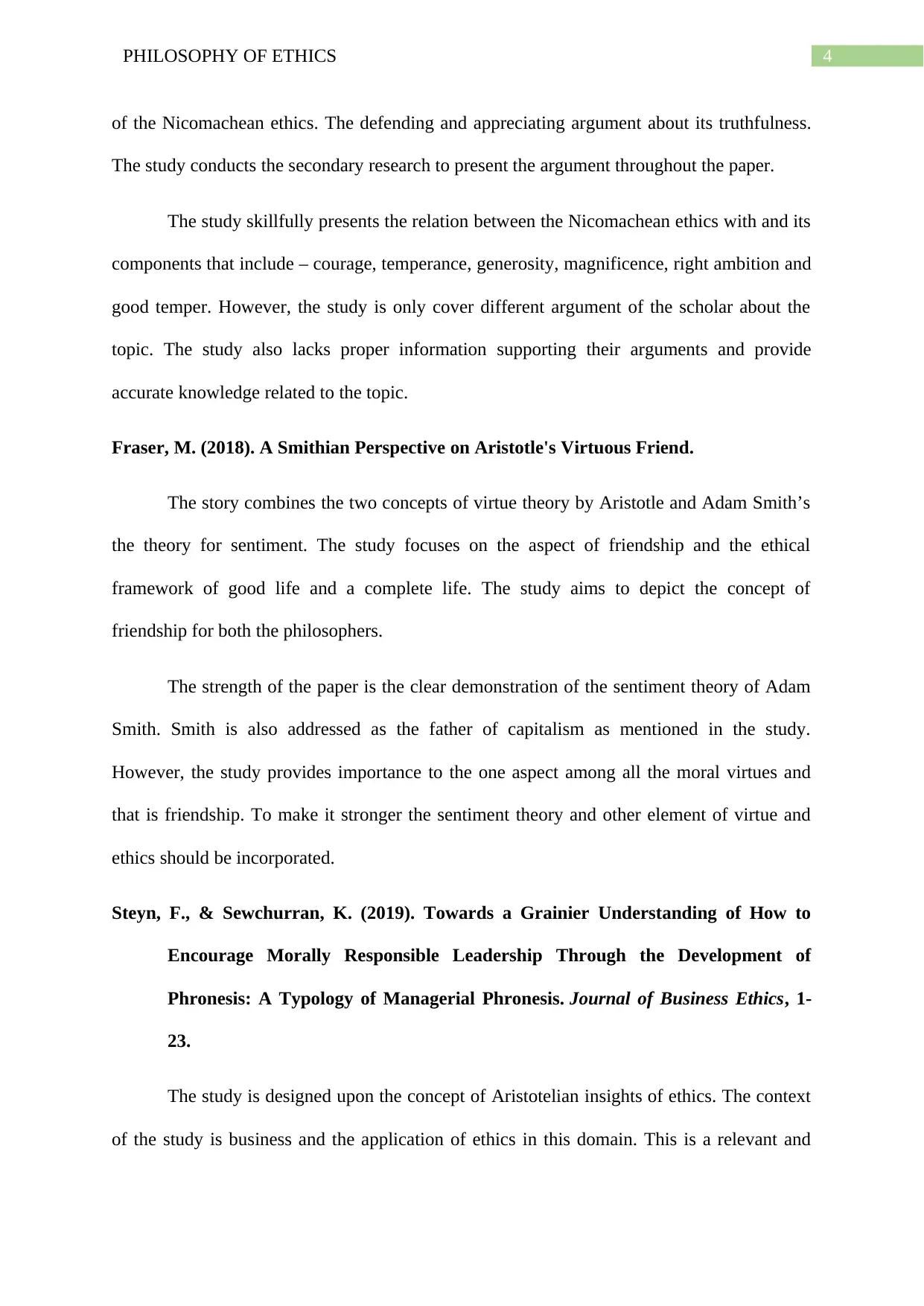
4PHILOSOPHY OF ETHICS
of the Nicomachean ethics. The defending and appreciating argument about its truthfulness.
The study conducts the secondary research to present the argument throughout the paper.
The study skillfully presents the relation between the Nicomachean ethics with and its
components that include – courage, temperance, generosity, magnificence, right ambition and
good temper. However, the study is only cover different argument of the scholar about the
topic. The study also lacks proper information supporting their arguments and provide
accurate knowledge related to the topic.
Fraser, M. (2018). A Smithian Perspective on Aristotle's Virtuous Friend.
The story combines the two concepts of virtue theory by Aristotle and Adam Smith’s
the theory for sentiment. The study focuses on the aspect of friendship and the ethical
framework of good life and a complete life. The study aims to depict the concept of
friendship for both the philosophers.
The strength of the paper is the clear demonstration of the sentiment theory of Adam
Smith. Smith is also addressed as the father of capitalism as mentioned in the study.
However, the study provides importance to the one aspect among all the moral virtues and
that is friendship. To make it stronger the sentiment theory and other element of virtue and
ethics should be incorporated.
Steyn, F., & Sewchurran, K. (2019). Towards a Grainier Understanding of How to
Encourage Morally Responsible Leadership Through the Development of
Phronesis: A Typology of Managerial Phronesis. Journal of Business Ethics, 1-
23.
The study is designed upon the concept of Aristotelian insights of ethics. The context
of the study is business and the application of ethics in this domain. This is a relevant and
of the Nicomachean ethics. The defending and appreciating argument about its truthfulness.
The study conducts the secondary research to present the argument throughout the paper.
The study skillfully presents the relation between the Nicomachean ethics with and its
components that include – courage, temperance, generosity, magnificence, right ambition and
good temper. However, the study is only cover different argument of the scholar about the
topic. The study also lacks proper information supporting their arguments and provide
accurate knowledge related to the topic.
Fraser, M. (2018). A Smithian Perspective on Aristotle's Virtuous Friend.
The story combines the two concepts of virtue theory by Aristotle and Adam Smith’s
the theory for sentiment. The study focuses on the aspect of friendship and the ethical
framework of good life and a complete life. The study aims to depict the concept of
friendship for both the philosophers.
The strength of the paper is the clear demonstration of the sentiment theory of Adam
Smith. Smith is also addressed as the father of capitalism as mentioned in the study.
However, the study provides importance to the one aspect among all the moral virtues and
that is friendship. To make it stronger the sentiment theory and other element of virtue and
ethics should be incorporated.
Steyn, F., & Sewchurran, K. (2019). Towards a Grainier Understanding of How to
Encourage Morally Responsible Leadership Through the Development of
Phronesis: A Typology of Managerial Phronesis. Journal of Business Ethics, 1-
23.
The study is designed upon the concept of Aristotelian insights of ethics. The context
of the study is business and the application of ethics in this domain. This is a relevant and

5PHILOSOPHY OF ETHICS
useful study for the students of the business school. The researchers focused on contemporary
literature related to phronesis and scholarship management to support the study.
The pupil from the business school can rely of the study to understand the business
ethics. However, the context of the notion is philosophy, which is not properly mentioned in
this study. They incorporated the ground theory however; it is only oriented for the business
domain.
useful study for the students of the business school. The researchers focused on contemporary
literature related to phronesis and scholarship management to support the study.
The pupil from the business school can rely of the study to understand the business
ethics. However, the context of the notion is philosophy, which is not properly mentioned in
this study. They incorporated the ground theory however; it is only oriented for the business
domain.
⊘ This is a preview!⊘
Do you want full access?
Subscribe today to unlock all pages.

Trusted by 1+ million students worldwide
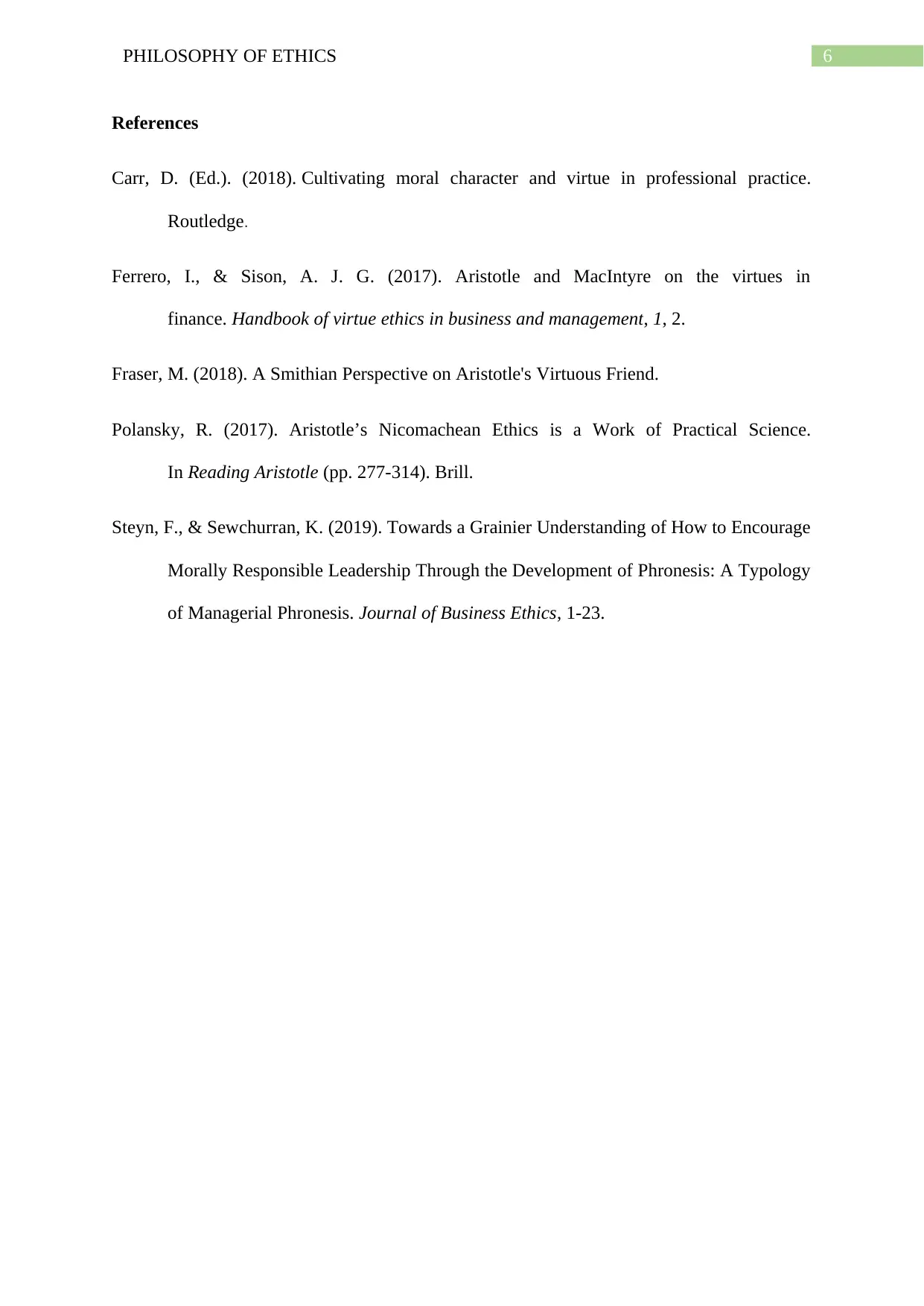
6PHILOSOPHY OF ETHICS
References
Carr, D. (Ed.). (2018). Cultivating moral character and virtue in professional practice.
Routledge.
Ferrero, I., & Sison, A. J. G. (2017). Aristotle and MacIntyre on the virtues in
finance. Handbook of virtue ethics in business and management, 1, 2.
Fraser, M. (2018). A Smithian Perspective on Aristotle's Virtuous Friend.
Polansky, R. (2017). Aristotle’s Nicomachean Ethics is a Work of Practical Science.
In Reading Aristotle (pp. 277-314). Brill.
Steyn, F., & Sewchurran, K. (2019). Towards a Grainier Understanding of How to Encourage
Morally Responsible Leadership Through the Development of Phronesis: A Typology
of Managerial Phronesis. Journal of Business Ethics, 1-23.
References
Carr, D. (Ed.). (2018). Cultivating moral character and virtue in professional practice.
Routledge.
Ferrero, I., & Sison, A. J. G. (2017). Aristotle and MacIntyre on the virtues in
finance. Handbook of virtue ethics in business and management, 1, 2.
Fraser, M. (2018). A Smithian Perspective on Aristotle's Virtuous Friend.
Polansky, R. (2017). Aristotle’s Nicomachean Ethics is a Work of Practical Science.
In Reading Aristotle (pp. 277-314). Brill.
Steyn, F., & Sewchurran, K. (2019). Towards a Grainier Understanding of How to Encourage
Morally Responsible Leadership Through the Development of Phronesis: A Typology
of Managerial Phronesis. Journal of Business Ethics, 1-23.
1 out of 7
Your All-in-One AI-Powered Toolkit for Academic Success.
+13062052269
info@desklib.com
Available 24*7 on WhatsApp / Email
![[object Object]](/_next/static/media/star-bottom.7253800d.svg)
Unlock your academic potential
Copyright © 2020–2026 A2Z Services. All Rights Reserved. Developed and managed by ZUCOL.
